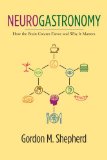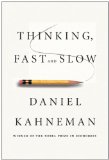November 1, 2011

Neurogastronomy: How the Brain Creates Flavor and Why It Matters by Gordon Shepherd (Columbia University Press, 2011)
(amazon.co.uk- 1 Dec)
Product description from the publisher:
Leading neuroscientist Gordon M. Shepherd embarks on a paradigm-shifting trip through the “human brain flavor system,” laying the foundations for a new scientific field: neurogastronomy. Challenging the belief that the sense of smell diminished during human evolution, Shepherd argues that this sense, which constitutes the main component of flavor, is far more powerful and essential than previously believed.
Shepherd begins Neurogastronomy with the mechanics of smell, particularly the way it stimulates the nose from the back of the mouth. As we eat, the brain conceptualizes smells as spatial patterns, and from these and the other senses it constructs the perception of flavor. Shepherd then considers the impact of the flavor system on contemporary social, behavioral, and medical issues. He analyzes flavor’s engagement with the brain regions that control emotion, food preferences, and cravings, and he even devotes a section to food’s role in drug addiction and, building on Marcel Proust’s iconic tale of the madeleine, its ability to evoke deep memories.
Shepherd connects his research to trends in nutrition, dieting, and obesity, especially the challenges that many face in eating healthily. He concludes with human perceptions of smell and flavor and their relationship to the neural basis of consciousness. Everyone from casual diners and ardent foodies to wine critics, chefs, scholars, and researchers will delight in Shepherd’s fascinating, scientific-gastronomic adventures.
Comments (0)
- cognitive science,new books,psychology
October 29, 2011

You Are Not So Smart: Why You Have Too Many Friends on Facebook, Why Your Memory Is Mostly Fiction, and 46 Other Ways You’re Deluding Yourself by David McRaney (Gotham, 2011)
(kindle ed.), (amazon.co.uk)
Product description from the publisher:
An entertaining illumination of the stupid beliefs that make us feel wise.
You believe you are a rational, logical being who sees the world as it really is, but journalist David McRaney is here to tell you that you’re as deluded as the rest of us. But that’s OK- delusions keep us sane. You Are Not So Smart is a celebration of self-delusion. It’s like a psychology class, with all the boring parts taken out, and with no homework.
Based on the popular blog of the same name, You Are Not So Smart collects more than 46 of the lies we tell ourselves everyday, including:
* Dunbar’s Number – Humans evolved to live in bands of roughly 150 individuals, the brain cannot handle more than that number. If you have more than 150 Facebook friends, they are surely not all real friends.
* Hindsight bias – When we learn something new, we reassure ourselves that we knew it all along.
* Confirmation bias – Our brains resist new ideas, instead paying attention only to findings that reinforce our preconceived notions.
* Brand loyalty – We reach for the same brand not because we trust its quality but because we want to reassure ourselves that we made a smart choice the last time we bought it.
Packed with interesting sidebars and quick guides on cognition and common fallacies, You Are Not So Smart is a fascinating synthesis of cutting-edge psychology research to turn our minds inside out.
See also: book blog
Google Books preview:
Comments (0)
- cognitive science,new books,psychology
October 25, 2011

Thinking, Fast and Slow by Daniel Kahneman (Farrar, Straus and Giroux)
(kindle ed.), (amazon.co.uk – 3 Nov)
Product description from the publisher:
Daniel Kahneman, recipient of the Nobel Prize in Economic Sciences for his seminal work in psychology that challenged the rational model of judgment and decision making, is one of our most important thinkers. His ideas have had a profound and widely regarded impact on many fields—including economics, medicine, and politics—but until now, he has never brought together his many years of research and thinking in one book.
In the highly anticipated Thinking, Fast and Slow, Kahneman takes us on a groundbreaking tour of the mind and explains the two systems that drive the way we think. System 1 is fast, intuitive, and emotional; System 2 is slower, more deliberative, and more logical. Kahneman exposes the extraordinary capabilities—and also the faults and biases—of fast thinking, and reveals the pervasive influence of intuitive impressions on our thoughts and behavior. The impact of loss aversion and overconfidence on corporate strategies, the difficulties of predicting what will make us happy in the future, the challenges of properly framing risks at work and at home, the profound effect of cognitive biases on everything from playing the stock market to planning the next vacation—each of these can be understood only by knowing how the two systems work together to shape our judgments and decisions.
Engaging the reader in a lively conversation about how we think, Kahneman reveals where we can and cannot trust our intuitions and how we can tap into the benefits of slow thinking. He offers practical and enlightening insights into how choices are made in both our business and our personal lives—and how we can use different techniques to guard against the mental glitches that often get us into trouble. Thinking, Fast and Slow will transform the way you think about thinking.
See also: “The Marvels and the Flaws of Intuitive Thinking” at Edge.org
Comments (0)
- cognitive science,mind,new books
October 21, 2011

Talking Heads: The Neuroscience of Language by Gianfranco Denes (Psychology Press, 2011)
(amazon.co.uk)
Product description from the publisher:
The origin, development, and nature of language has been the focus of theoretical debate among philosophers for many centuries. Following the pioneering clinical observations 150 years ago of loss of language following a cerebral lesion, language started to be considered a biological system, that could be investigated scientifically. As a consequence, an increasing number of scientists began to search for its anatomical and functional basis and its links with other such cognitive systems. The relatively recent introduction of neuroimaging tools, such as PET and fMRI, has brought rapid and groundbreaking developments to the field of Neurolinguistics.
In this book, Denes harnesses these advances to adopt a biolinguistic approach to the study of a subject that increasingly sees the collaboration of linguists, experimental psychologists, neuroscientists and clinicians. Talking Heads reviews the latest research to provide a concise analysis of the multifaceted aspects of language which focuses both on theoretical aspects and physical implementation.
Following an up-to-date description of acquired language disorders, and their contribution to the design of a functional architecture of language, the book illustrates the neurological process involved in the production and comprehension of spoken and written language, as well as investigating the neurological and functional systems responsible for sign language production and first and second language acquisition.
With a glossary of the anatomical and linguistic terms, this book provides an invaluable resource to undergraduate and graduate students of psychology, psycholinguistics and linguistics.
See also: Sample chapter (pdf)
Comments (0)
- cognitive science,language,new books
October 19, 2011

Teaching Minds: How Cognitive Science Can Save Our Schools by Roger Schank (Teachers College Press, 2011)
(amazon.co.uk)
Product description from the publisher:
From grade school to graduate school, from the poorest public institutions to the most affluent private ones, our educational system is failing students. In his provocative new book, cognitive scientist and bestselling author Roger Schank argues that class size, lack of parental involvement, and other commonly-cited factors have nothing to do with why students are not learning. The culprit is a system of subject-based instruction and the solution is cognitive-based learning. This groundbreaking book defines what it would mean to teach thinking. The time is now for schools to start teaching minds!
See also: Author’s website
Comments (0)
- cognitive science,culture,mind,new books







